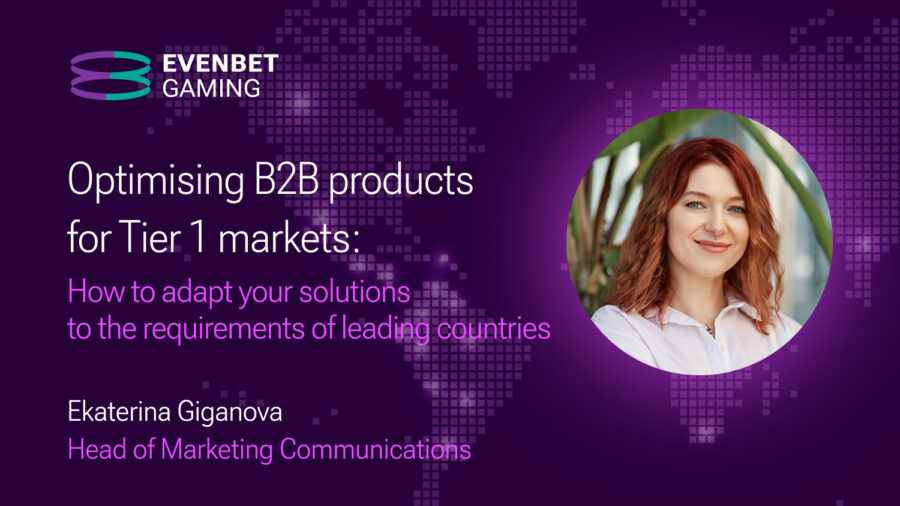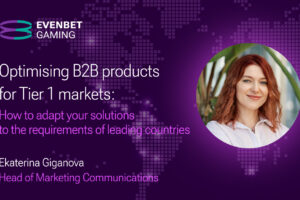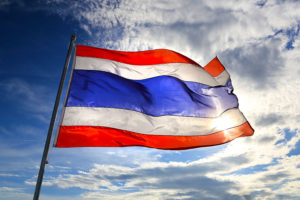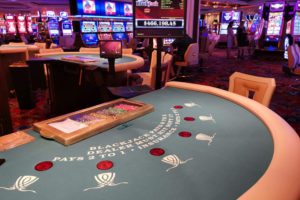EvenBet Gaming shares challenges of optimising B2B products for Tier 1 markets

Ekaterina Giganova, head of marketing communications in EvenBet Gaming highlights the opportunities and challenges of optimizing B2B products for Tier 1 markets and solutions for legalization.
Press release.- In 2024, Tier 1 countries are the most desired regions, which may bring the highest revenue, quality leads, and a big boost to the company’s reputation. At the same time, strict regulations may delay entry into the market by as much as five or even more years. The importance of localisation within iGaming has been highlighted by EvenBet in the GEO Adaptation article emphasising regulatory compliance and cultural nuances.
Ekaterina Giganova, head of marketing communications in EvenBet Gaming shares the unexplored opportunities as well as challenges of optimizing B2B products for Tier 1 markets and solutions for legalization.
Which regions are considered mature markets for B2B products in iGaming?
Mature markets in Tier 1 are those that have already established their regulation processes and set clear working rules for online gaming products. These are the countries where work with operators is established, activity tracking mechanisms exist to combat illegal operations, and the audience has high purchasing power.
First of all, it is Western Europe and countries such as the Netherlands, UK, France, Spain, and Malta. Eastern Europe, some countries of the south like Greece, and the United States are omitted here. The USA is still an emerging market that has challenging issues with advertising and marketing activities in iGaming. The same goes for attracting new players. There are no clear schemes regarding what the operator can use or not.
What challenges do new B2B companies face in Tier 1, and how to compete with established key players?
When discussing B2B businesses on Tier 1, we understand it is a “red ocean” market with industry-defined boundaries. The primary challenge for new companies is the established presence of key players, such as BetConstruct, Pragmatic Play, or Playtech, who have long occupied the niche and own a significant market share in both B2B and B2C. That causes challenges for newbies to enter the field with B2B products. As a result, emerging businesses and products must look for new, non-standard approaches and ideas within their own niches, finding customers willing to step up from standard, familiar schemes.
Meanwhile, many companies opt not to enter Tier 1 regions and instead concentrate on growing markets, thus avoiding potential global financial and reputational losses. At EvenBet, while we also prioritise emerging markets, we maintain our enthusiasm and undertake PR activities targeted at Tier 1. Our poker and card game solutions, technologically and opportunity-wise, are apt to compete with those already present and adopted by the operators. Even entering such markets with a small project can significantly enhance the company’s reputation and revenue.
How can businesses address reputation and data privacy concerns?
Besides finding a niche and employing non-standard approaches, we should employ 3 main rules:
1. Build your reputation and brand strategy cautiously: Tier 1 is the market that is impossible to enter without quality branding, a prudently built reputation, and carefully considered PR campaigns. And more than a good-quality product is required. You should consider that you concur with companies and products that are time-tested and approved by hundreds of users and other companies. You can not be inferior in reputation, brand presentation, and PR activities.
At the same time, building brand awareness in Tier 2 and Tier 3 markets is often impossible without implementing it in Tier 1 regions. No matter which market you focus on, you won’t be able to sustain your presence there for long without employing a comprehensive brand strategy. Such a complex approach lies in EvenBet Gaming’s strategy.
2. Consider data privacy and promote responsible gaming: These are the key points. Most major companies in Tier 1 select their products through tenders. In the tender applications, a significant section is dedicated to combating fraud and money laundering, protecting player data, and outlining the tools the product offers for responsible gaming. Emerging businesses should consider all these points during the product development stage. This includes outlining how the company will manage PR activities around these issues, promote responsible gaming, specify the platform’s features, and ensure additional security measures for users and operators.
3. Apply anti-fraud solutions and money laundering protection: One of the biggest challenges for operators in Tier 1 is that they have to report to the regulator on the measures taken for protection from money laundering. EvenBet Gaming products are greatly adapted to all privacy and KYC regulations, which regulators require from operators. Plus, we have great solutions for anti-fraud protection, which prevents money laundering and opaque financial transactions.
Poker is a high-risk game with a dubious reputation since, previously, it was often used to withdraw illegal income. As the player does not play against the casino but against another player, it’s not so hard to enter the private table and transfer chips to one another. For such cases, we have developed a system for identifying illegal transactions in the game and preventing them.
What role do licensing and certification play in Tier 1 markets?
It is no surprise that licensing and certification are extremely important and offer significant advantages that a product can provide to an operator. In countries such as Spain or Italy, you will not be able to operate without certification.
To obtain a license, you have to confirm that your product meets all the regulator’s technical requirements. This includes a certified RNG and a confirmation that your game is fair, where players and operators cannot gain an illegal advantage. At EvenBet, we have certificates from all major laboratories, such as GLI, iTech Labs, Quinel, and BMM Testlabs. That allowed us to obtain a B2B license in Malta, enabling EvenBet to distribute products in European markets (excluding those that exclusively accept internal licenses). Furthermore, we have secured approval from regulatory bodies in Spain, the Netherlands, and Italy and are currently in the pre-approval stage in the UK. And every company interested in the Tier 1 market will have to go through this process.
In addition to the standard technical certification, which we utilize for random number generators, we also hold ISO 27001 certification. It confirms our adherence to information security standards, ensuring comprehensive information protection within our product.
This process of obtaining all the necessary certifications and licenses at EvenBet took almost 10 years, and it’s important to mention that a company that tries to build such a reputation can not succeed within 1-2 years. Certification is quite a long, expensive, and rocky path, but definitely worth it.
Conclusion
Fierce competition, strict licensing and certification rules, and big attention to data privacy contribute to the fact that all newbies pay more attention to emerging markets. There is less competition for both players and operators because operators do not have many products and opportunities to add new solutions to their platforms constantly. In regions like Africa and South America, active growth can be seen. Less in Southeast Asia, due to localization and regulation difficulties in the market.
See also: EvenBet Gaming analyses the peculiarities of card games in the Asian region
Europe is a tidbit for all B2B providers. Even though the niche is already occupied, there is a huge business sense in entering Tier 1 markets, and sometimes even a business necessity. Here are the key pieces of advice for optimizing B2B products in Tier 1 markets:
- Embrace Innovation and Find Your Niche: innovate within your niche, offering unique solutions that address the specific needs or preferences of Tier 1 customers.
- Prioritise Reputation Building: demonstrating trustworthiness and reliability is essential for gaining the confidence of Tier 1 clients.
- Focus on Data Privacy and Responsible Gaming.
- Obtain Necessary Certifications and Licenses: acquiring licenses from regulatory bodies is crucial for credibility and trustworthiness.
- Prepare for a Long-Term Commitment: be prepared for a journey that may span several years but promises substantial rewards in revenue and brand recognition.
Even one project in a developed market can bring five times more reputation and brand awareness than in any market just starting to shape. By following these strategies and maintaining perseverance, B2B providers can position themselves for success in Tier 1 market








